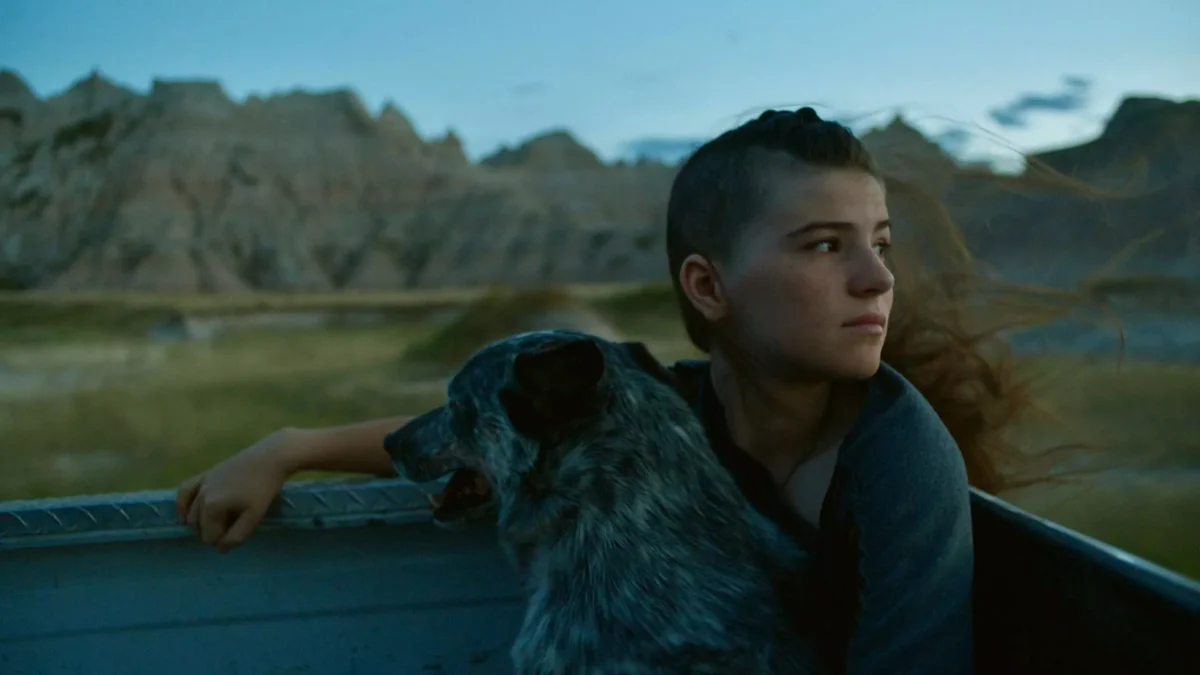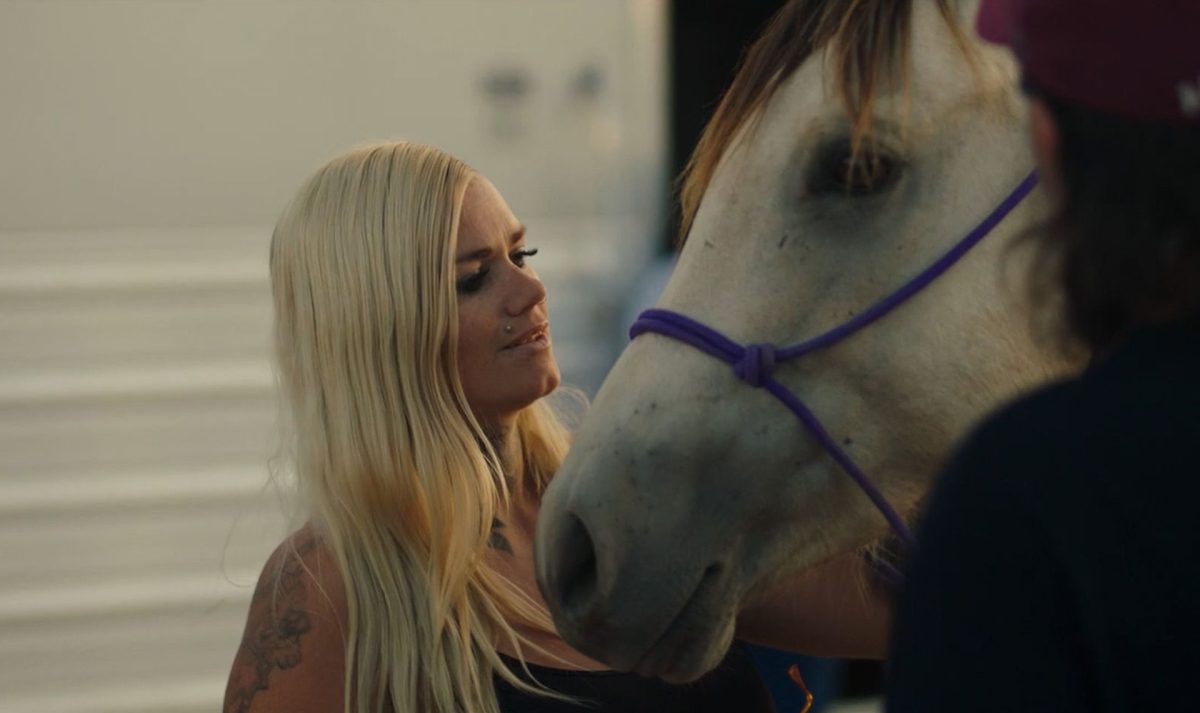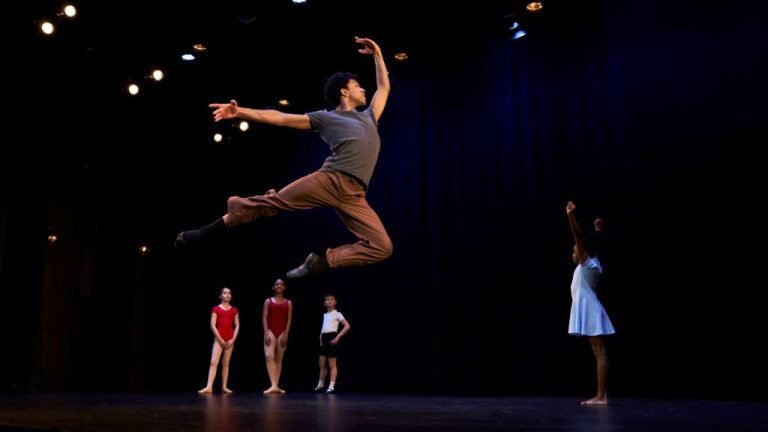When crafting a story about a marginalized, underrepresented, or challenged community, a filmmaker must take extra precautions in order to ensure that their work is not exploitative. Given that their film may be one of the few pieces of exposure that its subjects ever receive, there needs to be a degree of sensitivity in examining the nuances of culture.
It would be hard to deny that director Kate Beecroft employed those techniques with her directorial debut “East of Wall” (2025), which stars the horse trainer Tabatha Zimiga as a lightly fictionalized version of herself. Unfortunately, the authenticity of Beecroft’s filmmaking does not make “East of Wall” any more compelling as a narrative, as it offers disappointingly rote observations about an undeniably fascinating situation.
Zimiga is grieving the death of her husband, but still owns and operates a ranch in which she trains, sells, and competes with horses alongside her teenage daughter Porshia, who also appears in the film as herself.
Although Zimiga is also caring for a three-year-old son who has begun to develop communication issues, she also maintains a crew of teenagers that live on her property, all of whom come from broken homes or fled neglectful parents. Zimiga is valued in her community for the empathy she shows to her children, wards, and clients, all of whom feel like one extended family. Unfortunately, the financial reality of the situation is that Zimiga’s business is crumbling, and she may be forced to give up on her version of “the American dream.”
There are two interesting approaches with “East of Wall” that unfortunately don’t congeal, creating a film that is often unbalanced and dramatically mute. Beecroft has clearly drawn inspiration from the lyricism of filmmakers like Chloe Zhao and Terrence Malick, who were able to gorgeously conduct investigations into unique subcultures without letting narrative conventions put them in a box.
Unfortunately, Beecroft has less opportunity to be artistic because of the docu-drama approach she has taken, as real life subjects are called upon to replicate their past experiences. Although it’s admirable that Beecroft was willing to give Zimiga the opportunity to tell her own story, the recreations of events simply aren’t riveting because of the limited dramatic license that is afforded.

The more artistic, scattershot collection of moments that encapsulate Zimiga’s experience is often undercut by the film’s intent to offer dramatic stakes in the form of the Fort Worth rancher Roy (Scoot McNairy), who makes an offer to purchase the ranch and employ its inhabitants.
It’s a rather obvious means of showing the dichotomy of Zimiga’s personality. She often makes questionable business decisions for the sake of retaining her independence, an outlook that becomes more challenging when she considers the people she is responsible for.
Although McNairy is one of the best character actors working today, and perfectly captures the plain-spoken vigor of a North Texan businessman, many segments with Roy feel artificially constructed to give a narrative arc to the film.
The blend of non-professional actors and legitimate stars can often feel awkward given their varying degrees of experience. Zimiga is undeniably a compelling subject, particularly when she is in her element performing her daily duties and tending to her children.
However, scenes in which Zimiga is asked to channel past emotions play more dryly, as it’s asking her to simulate a specific moment in her life that she has already moved past. Considering that many of the more dramatic instances of trauma within Zimiga’s life are recalled, but not directly recreated, it’s easy to imagine that “East of Wall” would have worked better if it had taken a purely documentation approach.
Considering that the suspense surrounding the ownership of the ranch falls into the cliches that are common within “slice-of-life” indie dramas, the dramatic crux of “East of Wall” rests upon truisms about grief, loss, and recovery that are made by Zimiga and her core group, including her mother Tracey (Jennifer Ehle), and her boyfriend, Clay Pateneaude (who appears as himself).
Ehle, a terrific character actress who did great work recently in “1923” and “Dead Ringers,” is asked to give the type of all-encompassing monologues that summarize the collective development of the characters. As beautiful as the writing is, it still feels like “writing” in a film that claims to be unpolished and objective. The realism isn’t aided by the insertion of voiceovers, which further blur the line about how much the audience should be buying into the narrative conceits.

“East of Wall” is not formless, as it has beautiful cinematography that captures the naturalistic wonder of the South Dakotan environment, and details an aspect of the American experience that is often not treated with the respect that it deserves. While aspects of cowboy culture have become mythologized, parodided, and taken out of context for the sake of making broad generalizations, “East of Wall” shows how adaptive decisions have resulted in unique traditions and unusual bonding experience.
While at no point does “East of Wall” feel like it is demeaning or stigmatizing its subjects, the film can’t help but show an awe at the type of work that Zimiga and her family do consistently, which makes it clear that there is an outsider’s voice intruding on the situation.
Perhaps, any sort of traditional documentary would have to involve an amount of “acting for the camera” that would be distracting, just as it would be challenging to find a contemporary actress who could realistically play Zimiga.
However, the unusual blend of non-fiction and dramatic storytelling puts “East of Wall” in a precarious position that reflects a lack of trust in both the audience and the subjects. It seems as if Beecroft assumed that either audiences needed a framing device to be engaged in such a niche world, or that Zimiga and her cohorts wouldn’t be compelling enough when left to their own routines.
Despite the noble intentions, “East of Wall” has a flawed approach that prevents it from developing any real insights, as both the filmmaker and real people are using different methods to tell their truth. As viscerally beautiful as “East of Wall” is, its rhythmic unevenness is a barrier in the visceral charms. Beecroft is clearly a talented filmmaker who may benefit from a focused approach to her next feature, as the ambition of “East of Wall” undercuts its intriguing area of focus.



![Kia and Cosmos [2019]: ‘Glasglow Film Festival’ Review](https://79468c92.delivery.rocketcdn.me/wp-content/uploads/2019/02/Kia_And_Cosmos_HOF1-768x502.jpg)


![Seal Team [2021] Netflix Review : Seals vs Sharks battle for survival loses itself to incoherent execution](https://79468c92.delivery.rocketcdn.me/wp-content/uploads/2022/01/Seal-Team-2021-768x432.jpg)

